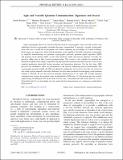Agile and versatile quantum communication : signatures and secrets
Abstract
Agile cryptography allows for a resource-efficient swap of a cryptographic core in case the security of an underlying classical cryptographic algorithm becomes compromised. Conversely, versatile cryptography allows the user to switch the cryptographic task without requiring any knowledge of its inner workings. In this paper, we suggest how these related principles can be applied to the field of quantum cryptography by explicitly demonstrating two quantum cryptographic protocols, quantum digital signatures (QDS) and quantum secret sharing (QSS), on the same hardware sender and receiver platform. Crucially, the protocols differ only in their classical postprocessing. The system is also suitable for quantum key distribution (QKD) and is highly compatible with deployed telecommunication infrastructures, since it uses standard quadrature phase-shift keying encoding and heterodyne detection. For the first time, QDS protocols are modified to allow for postselection at the receiver, enhancing protocol performance. The cryptographic primitives QDS and QSS are inherently multipartite, and we prove that they are secure not only when a player internal to the task is dishonest, but also when (external) eavesdropping on the quantum channel is allowed. In our first proof-of-principle demonstration of an agile and versatile quantum communication system, the quantum states are distributed at GHz rates. A 1-bit message may be securely signed using our QDS protocols in less than 0.05 ms over a 2-km fiber link and in less than 0.2 s over a 20-km fiber link. To our knowledge, this also marks the first demonstration of a continuous-variable direct QSS protocol. © 2021 authors.
Citation
Richter , S , Thornton , M , Khan , I , Scott , H , Jaksch , K , Vogl , U , Stiller , B , Leuchs , G , Marquardt , C & Korolkova , N 2021 , ' Agile and versatile quantum communication : signatures and secrets ' , Physical Review X , vol. 11 , no. 1 , 011038 . https://doi.org/10.1103/PhysRevX.11.011038
Publication
Physical Review X
Status
Peer reviewed
ISSN
2160-3308Type
Journal article
Description
This research receives funding from the European Union’s Horizon 2020 research and innovation program under Grant Agreement No. 820466 (CiViQ). This research is also funded by the German Federal Ministry of Education and Research within the project Hardware-based Quantum Security. The authors gratefully acknowledge the support from the Scottish Universities Physics Alliance and the Engineering and Physical Sciences Research Council. This project was supported within the framework of the International Max Planck Partnership with Scottish Universities.Collections
Items in the St Andrews Research Repository are protected by copyright, with all rights reserved, unless otherwise indicated.

